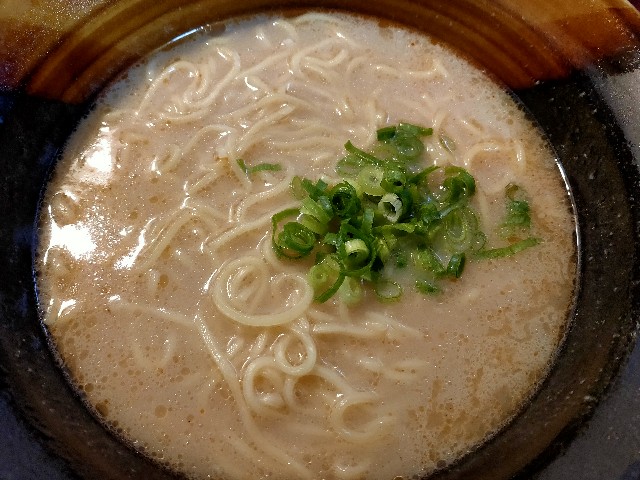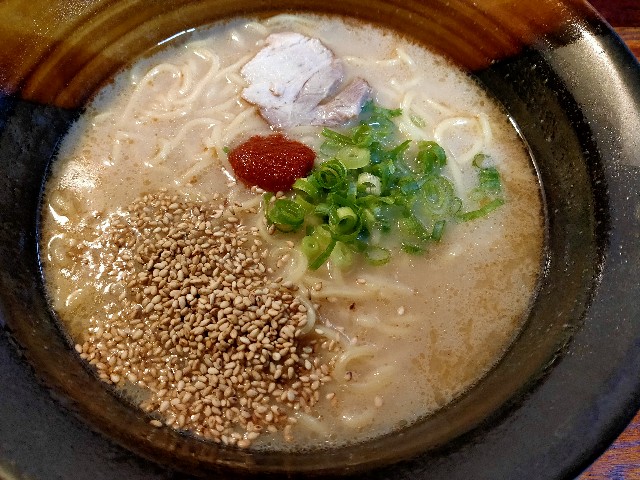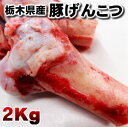By the next day, the soup becomes even more mellow, and the taste improves. Just by simmering 2kg of pork bones, aromatic vegetables, and a few ingredients, it becomes this delicious, which shows that pork bones are a food ingredient with great potential. This is plain ramen. In this way, even with the minimum ingredients of soup, noodles, and green onions, it seems to be nutritious and tasty.
Adding sesame, spicy sauce, and just one slice of Chashu makes it like this.

Making Tonkotsu Ramen is hard, but you can enjoy it in various ways depending on your ingenuity.
To be continued...
Click the link below to view the Japanese version of the article
博多ラーメン (Hakata Ramen): A type of ramen from Hakata district of Fukuoka city in Japan. It features thin, straight noodles and rich, milky pork-bone tonkotsu broth.
とんこつラーメン (Tonkotsu Ramen): A ramen dish that originated in Fukuoka, Japan on the Kyushu island. It has a cloudy white broth made from boiling pork bones, fat, and collagen over high heat for many hours.
自作 (Jisaku): Means "do-it-yourself" or "homemade". It refers to the act of making or creating something by oneself.
翌日 (Yokujitsu): Means "the next day". It's used to refer to the day after the current day.
スープ (Soup): In the context of ramen, it refers to the broth that is used. The broth can be made from various ingredients, including pork bones, chicken, seafood, or vegetables.
まろやか (Maroyaka): A Japanese adjective used to describe something smooth, mellow, or rich. In the context of food, it often refers to a rich and smooth flavor or texture.
味 (Aji): Means "taste" or "flavor". It's a fundamental term in discussing food and cooking.
とんこつ (Tonkotsu): Refers to pork bones. In the context of ramen, it's often used to describe a type of broth made by boiling pork bones for a long time.
香味野菜 (Koumi Yasai): Refers to aromatic vegetables. Common examples include onions, carrots, and celery.
素ラーメン (Su Ramen): Refers to plain ramen, typically consisting of just noodles and broth, without any additional toppings.
麺 (Men): Means "noodles". In the context of ramen, it refers to the wheat noodles served in broth.
ネギ (Negi): Refers to green onions or scallions. They are often used as a topping in ramen.
滋養 (Shiyou): Means "nutrition" or "nourishment". It refers to the nutrients that are necessary for growth and health.
ごま (Goma): Means "sesame". Sesame seeds are often used in Japanese cuisine for their nutty flavor and crunchy texture.
辛みタレ (Karaimi Tare): Refers to spicy sauce. It's often used as a condiment or topping in various dishes.
チャーシュー (Chashu): Refers to a specific method of preparing pork in Chinese cuisine. In the context of ramen, it's a common topping and is usually braised in a mixture of soy sauce, sugar, and other flavors.
工夫 (Kufuu): Means "ingenuity" or "creativity". It refers to the act of thinking creatively or inventively to solve a problem or create something new.
楽しむ (Tanoshimu): Means "to enjoy". It's used to express the act of enjoying something, such as a meal or an activity.
おうち (Ouchi): Means "home". It's a casual term for one's own home.
レシピ (Reshipi): Means "recipe". It's a set of instructions for preparing a particular dish.
基準 (Kijun): Means "standard" or "basis". It's used to refer to a level or standard that serves as a basis for comparison or judgment.
家史上最高 (Kashi Jou Saikou): Literally translates to "the best in family history". It's a phrase used to express that something is the best that has ever occurred or been made in one's family.
一杯 (Ippai): Literally translates to "one cup", but in this context, it refers to "one bowl" of ramen.
作り方 (Tsukurikata): Means "how to make" or "method of making". It's often used in the context of recipes or instructions for creating something.
ブログ (Burogu): Means "blog". It's a regularly updated website or web page, typically run by an individual or small group, that is written in an informal or conversational style.
村 (Mura): Means "village". In the context of "Japan Blog Village", it likely refers to a community of bloggers.
日本 (Nihon): Means "Japan". It's the name of the country located in East Asia.
プレミアム (Premium): A term borrowed from English, used to denote high quality or superior status.
デリ (Deli): Short for "delicatessen", a store selling cooked meats and other foods ready for serving.
単語解説
Homemade (形容詞): 自家製の、自作の。自分で作ったもの、または家で作ったものを指す。
Hakata-style (形容詞): 博多風の。福岡市の博多地区に由来するスタイルや特徴を指す。
Tonkotsu Ramen (名詞): とんこつラーメン。九州の福岡県で生まれたラーメンの一種で、豚骨を長時間煮込んで作る白濁したスープが特徴。
Soup (名詞): スープ。液体の食品で、通常は熱して食べる。ラーメンの場合、スープはブロスを指す。
Mellow (形容詞): まろやかな、円熟した。食べ物や飲み物が滑らかで豊かな風味を持つことを表す。
Taste (名詞): 味。食べ物や飲み物が口の中で感じる感覚。
Pork bones (名詞): 豚骨。豚の骨。ラーメンのスープを作るための一般的な材料。
Aromatic vegetables (名詞): 香り高い野菜。料理に風味を加えるために使われる野菜。
Ingredients (名詞): 材料。料理を作るために必要なもの。
Delicious (形容詞): 美味しい。味が良いと感じること。
Potential (名詞): ポテンシャル、可能性。何かが将来的に達成できる能力や状態。
Plain (形容詞): 素の、普通の。何も加えられていない状態、または基本的な状態を指す。
Noodles (名詞): 麺。小麦粉を主成分とする食品で、ラーメンの主要な部分。
Green onions (名詞): ネギ。料理に風味を加えるために使われる野菜。
Nutritious (形容詞): 栄養価が高い。体に必要な栄養素を多く含む。
Sesame (名詞): ゴマ。食用の種で、料理に風味を加えるために使われる。
Spicy sauce (名詞): 辛いソース。辛さを加えるために使われる調味料。
Slice (名詞): 一切れ。何かを薄く切ったもの。
Chashu (名詞): チャーシュー。中国料理の一種で、豚肉を甘辛く煮込んだもの。ラーメンのトッピングとしてよく使われる。
Hard (形容詞): 困難な、難しい。努力や労力を必要とする状態。
Ingenuity (名詞): 工夫、独創性。新しいアイデアや解決策を思いつく能力。
Enjoy (動詞): 楽しむ。何かを心地よく感じること。
Recipe (名詞): レシピ。料理を作るための手順と必要な材料のリスト。
Basis (名詞): 基準、基礎。何かを評価、判断、または理解するための出発点。
Best (形容詞): 最高の。他のすべてよりも優れている状態。
Bowl (名詞): 一杯。容器の中に入った食べ物や飲み物の量。
Method (名詞): 方法、手段。特定の結果を達成するための手順やプロセス。
Blog (名詞): ブログ。個人や小グループによって運営され、定期的に更新されるウェブサイトやウェブページ。
Village (名詞): 村。小さな町やコミュニティを指す。
Japan (名詞): 日本。東アジアに位置する国。
History (名詞): 歴史。過去の出来事や事実の記録または研究。
Family (名詞): 家族。血縁または法的な絆によって結ばれた人々のグループ。
Homemade (形容詞): 自家製の。家で作られた、または自分で作られたもの。
Standard (名詞): 基準、標準。評価、判断、または比較のための基準。
Based (形容詞): 基づいた。何かに基づいている、またはそれから派生している。
Soup (名詞): スープ。液体の食品で、通常は熱して食べる。
Website (名詞): ウェブサイト。インターネット上の一連の関連したウェブページの集まり。
Webpage (名詞): ウェブページ。インターネット上の一つの文書または情報のソース。
Informal (形容詞): 非公式の、カジュアルな。公式または正式でない、親しみやすいスタイル。
Conversational (形容詞): 会話の、対話的な。会話のような、または会話を模倣した。
Style (名詞): スタイル、様式。特定の方法、技術、または表現の特性。
Individual (名詞): 個人。特定の人、または一人の人。
Small group (名詞): 小グループ。少数の人々から成る集団。
Regularly (副詞): 定期的に。一定の間隔で、または繰り返し。
Updated (形容詞): 更新された。最新の情報に変更または修正された。
Premium (形容詞): プレミアムの、高級な。高品質または高価格を示す。
Deli (名詞): デリ。調理済みの食品を販売する店。
Brand (名詞): ブランド。商品やサービスを特定の製造業者または販売業者と関連付けるための名前や記号。
Product (名詞): 製品。製造、生産、または作成された何か。
Related (形容詞): 関連した。何かと何かが接続、関連、または関連性を持つこと。



